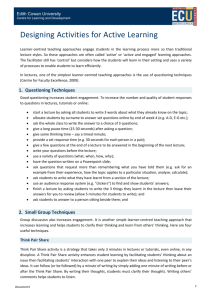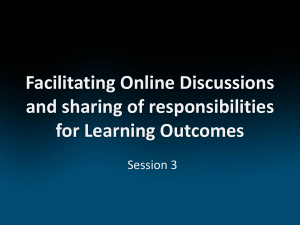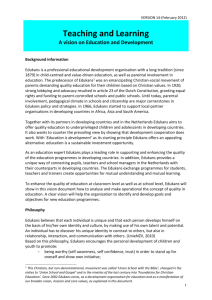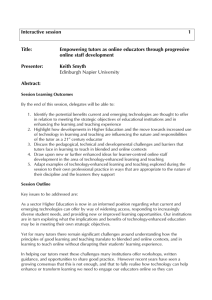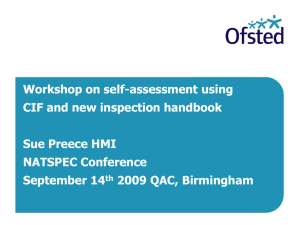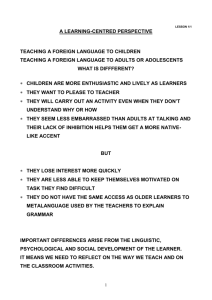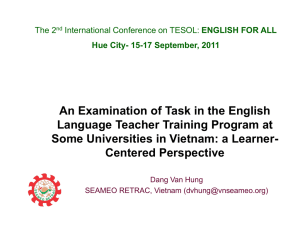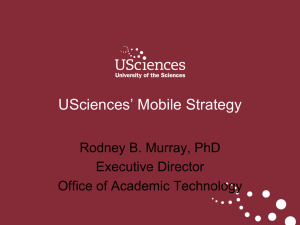Learner-centred environments
advertisement
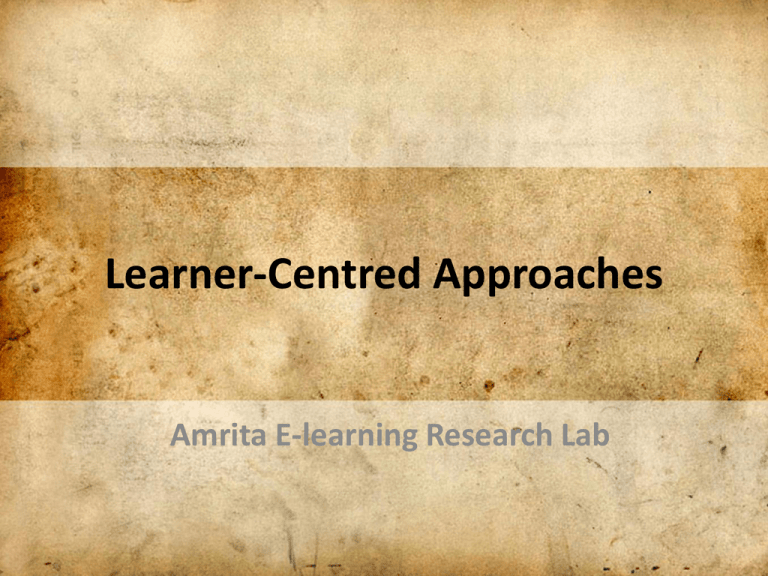
Learner-Centred Approaches Amrita E-learning Research Lab Learner-Centred Approaches • • • • What is learner-centred teaching? Why do we need learner-centred approaches? What are the characteristics of learner-centred approaches? Some learner-centred methods and examples What is Learner-Centred Teaching? • Teacher-led pedagogy - ‘lecturing, note-taking, and memorizing information for later reproduction’ • Learner-centred approach shifts the focus of activity from the teacher to the learners Emphasizes what the learners do as against what the teacher does • Based on constructivist theories Learners are not passive recipients of information; they construct and reconstruct knowledge in order to learn Why do we need Learner-Centred Teaching ? • Research shows that learner-centered methods lead to Increased student engagement with the content Deep learning Long term retention Acquisition of critical thinking or creative problem-solving skills Positive attitude toward the subject being taught Confidence in knowledge or skills Characteristics of Learner-Centred Teaching Five practices that need to change: The functions of content The role of the teacher The responsibility for learning The processes and purposes of evaluation The balance of power Weimer, M. (2002). Learner-centered teaching. San Francisco: Jossey-Bass. Methods • Learner-centred teaching does not employ a single teaching method. Emphasizes a variety of methods that shift the role of the instructors from givers of information to facilitators of student learning. Some learner-centred methods • Active learning Students solve problems, answer questions, formulate questions of their own, discuss, explain, debate, or brainstorm during class • Cooperative learning Students work in teams on problems and projects under conditions that assure both positive interdependence and individual accountability • Inductive teaching and learning Students are first presented with challenges (questions or problems) and learn the course material in the context of addressing the challenges. Includes inquiry-based learning, case-based instruction, problem-based learning, project-based learning, discovery learning, and just-in-time teaching. Some learner-centred methods Flipped Classrooms • Inverts traditional classroom teaching methods • Delivers instruction outside of class • Activities, discussions, “homework” in class Dr. Sugata Mitra’s Hole-in-the-Wall Project http://www.hole-in-the-wall.com/ Self-Organized Learning Environments (SOLE) • Children group around Internet-equipped computers to discuss big questions. • The teacher merges into the background and observes as learning happens. The School in the Cloud • Cloud-based, scalable approaches to selfdirected learning. References • • • • • • • • • http://www.usciences.edu/teaching/LearnerCentered/implementing%20lct.pdf http://www.usciences.edu/teaching/Learner-Centered/ http://www4.ncsu.edu/unity/lockers/users/f/felder/public/StudentCentered.html http://sc.edu/fye/events/presentation/annual/2012/files/CT-145.pdf http://www.hole-in-the-wall.com/ www.uncp.edu/tlc/presentations/.../learner-centered_teaching.ppt http://jittdl.physics.iupui.edu/jitt/ http://download.eiie.org/SiteDirectory/hersc/Documents/2010%20T4SCL%20Stakeholders%20F orum%20Leuven%20%20An%20Insight%20Into%20Theory%20And%20Practice.pdf http://www.ted.com/talks/sugata_mitra_build_a_school_in_the_cloud.html
